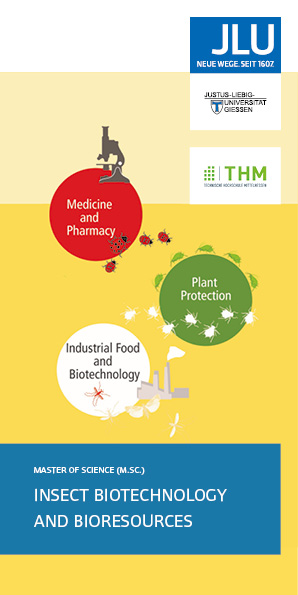Insect Biotechnology and Bioresources (M.Sc.)
Master of Science (M.Sc.)
Overview
- IBB - Bildseite
-

-
Foto: © 2018 Erika Heil, art for biomed
- Englischer Studiengang
-
 This course of study is taught in English.
This course of study is taught in English.
- Overview-rest
-
With more than one million scientifically described species, insects are the largest group of organisms on Earth. As an emerging interdisciplinary research area, insect biotechnology explores insects as well as insect-associated micro- and macro-organisms as emerging bioresources in the fields of medicine, crop protection, pharmaceuticals, industrial food and biotechnology.
During your studies you will deal intensively with the systematics and ecology of insects and acquire specific scientific and technical knowledge. You will also learn about various methodical research approaches to investigate insects and their associated organisms as a new resource for food and luxury food, enzymes and bioactive natural products and finally to refine fully developed products.
The study programme is characterized by a strong emphasis on research and practical relevance, as well as a high level of interdisciplinary approaches and projects.
Composition of the Study Programme
- Composition of the Study Programme
-
Degree
Master of Science (M.Sc.)
Duration of Studies
4 semesters – 120 credit points (cp)
Composition of the Degree Programme
The study programme is organized in modules (courses). Each module comprises four semester hours per week and is completed with a final examination as given in the module description. The final grade of the study programme is calculated from the achieved module grades.
The course consists of 8 mandatory modules (core modules), 6 optional modules (profile modules), an industrial internship (or 2 more profile modules) and the Master‘s thesis. Having completed the core modules, the students are well equipped with a solid scientific education and ready to deepen their knowledge in specific research areas. By individually choosing their profile modules from a diverse range of study areas, students shape their individual competence profile.
Structure of the Master's Degree Course
The Master’s degree course consists of 16 modules (120 credits):
Modules Core Competence
(mandatory modules)8 modules 48 credits Profile Competence
(optional modules)8 modules or
6 modules + industrial intership
48 credits Master’s thesis 24 credits Total 16 modules 120 credits Core Modules (Mandatory Courses)
- Applied Statistics (6 CP)
- Natural Product Chemistry (6 CP)
- Entomology I (6 CP)
- Insect Biotechnology and Integrated Pest Management (6CP)
- Entomology II (6 CP)
- Food Technology (6 CP)
- Bioprocess Engineering I (6 CP)
- Bioresources für Natural Product Discovery (6 CP)
Profile Modules (6 CP each)
Students tailor their individual profile by selecting 6 modules and the internship or 8 modules from the entire profile module catalogue of the faculty. For example, you can choose profile modules from the following subject areas:
- Plant Breeding
- Phytopathology
- General and Soil Microbiology
- Insect Biotechnology in Plant Protection
- Microbiology of Recycling Processes
- Agricultural and Food Market Analysis
- Insect Biotechnology
- Natural Product Research
- Landscape, Water and Biogeochemical Cycles
- Landscape Ecology and Landscape Planning
- Agricultural, Food and Environmental Policy
- Agronomy and Crop Physiology
- Biometry and Population Genetics
- Crop Biomass and Bioresources
- Bioprocess Engineering and Pharmaceutical Technology
- Political Science
Internship (optional) (12 CP)
The Master's degree programme offers a voluntary internship that enables our students to gain an initial insight into the various areas of professional activity in which they hope to pursue in the future. The internship also enables them to collect hands-on professional experience and establish contacts with potential employers. The internship can be conducted in various areas such as the chemical industry, agricultural corporations, the food industry, government agencies or NGOs. The variety of contacts that our faculty possesses allow us to provide expert support to students seeking an internship.
More information about the internship
Master Thesis (24 CP)
Students dedicate the major part of the 4th semester to writing the Master’s thesis. With the thesis, students prove their capability to independently research a given topic scientifically within a limited period of time.
Application
- Start WS-engl: Commencement of studies
-
Commencement of Studies
Only possible in the winter semester.
- Bewerbergruppen-engl
-
Application Procedure
Depending on where you obtained either your university entrance certificate or your Bachelor degree, we differentiate two application procedures:
Case A
You need to use JLU’s application portal if
- you hold a completed Bachelor’s degree obtained at a German university (the country of origin of your university entrance certificate is of no importance).
- your German Bachelor programme is not yet complete. Please provide a preliminary report. The country of origin of your university entrance certificate is of no importance.
- you want to change to another degree programme at JLU. The country of origin of your university entrance certificate is of no importance.
Case B
You need to submit your application to uni-assist if
- you hold a completed Bachelor’s degree obtained at a foreign university (the country of origin of your university entrance certificate is of no importance).
- you obtained your university entrance certificate abroad and attended but not completed yet a Bachelor programme at any other university within EU. Please provide a preliminary report.
- Application: deadline, intake capacity, fees
-
Intake capacity ("Numerus Clausus")
The intake capacity of this degree programme is not limited internally by the university.
Deadline
- Application for enrolment starts
- for applicants with a German Bachelor's: June 1
- for applicants with an international Bachelor's degree: May 1
- Application deadline
- for applicants with a German Bachelor's: June 15 // extended until October 11
- for applicants with an international Bachelor's degree: June 15
Fees
No study fees are charged for this study program. However, students have to pay a semester contribution of approx. 340 EUR for administration and the Germany semester ticket (details).
- Application for enrolment starts
- Application: Entrance requirements
-
Admission Requirements
Applicants must hold a Bachelor's degree with at least 180 ECTS-points in one of the following scientific fields:
- Agricultural Sciences
- Biology
- Biotechnology
- Chemistry
- Food Chemistry
Other Bachelor's degrees can be accepted as an equivalent degree by the board of examiners.
The application includes a letter of motivation with 500 words (+/- 10%) outlining the candidate’s personal motivation and his or her subject-specific knowledge.
Applications will be examined individually as to whether the study requirements are fulfilled. A specialist commission at JLU will then finally decide on the admission. The criteria for the evaluation of the motivation letter are given in the examination regulations. We cannot provide information on the status of acceptance before the application process is fully completed.
- Application: Language requirements
-
Language Requirements
As the entire degree course is taught in English, applicants must provide proof of sufficient knowledge of written and spoken English. Accepted proofs of language proficiency:
- either: TOEFL-Test ITB (internet-based test) with at least 95 points or IELTS-Test with at least grade of 7 in the academic test;
- or: Proof of obtaining a local higher education entrance qualification in one of the following countries: Australia, Ireland, Canada, New Zealand, USA, United Kingdom, South Africa;
- or: Proof of a Bachelor’s degree in English in one of the following countries: Australia, Ireland, Canada, New Zealand, USA, United Kingdom, South Africa;
- or: Proof of the UNIcert III certificate.
- Further information-admission international
-
For further information please contact:
Registrar’s Office / Studierendensekretariat
Goethestrasse 58
Postal address: Postfach 11 14 40, 35359 Giessen
Tel.: 0641/99-16400
international.admission@admin.uni-giessen.de / stud-sekretariat@admin.uni-giessen.de
Career Options
Contact
-
Course Directors
- Insect Biotechnology and Bioresources (englischsprachiger Studiengang)
-
Prof. Dr. Andreas Vilcinskas
Department of Insect BiotechnologyHeinrich-Buff-Ring 26-32
35392 Gießen
Phone: +49 641/99-37600
Andreas.vilcinskas@agrar.uni-giessen.de
Prof. Dr. Marc Schetelig
Marc.schetelig@agrar.uni-giessen.de
PD Dr. Thomas Degenkolb
thomas.degenkolb@ernaehrung.uni-giessen.de
Further Information
- Further Information: Dokumente
-
PDF documents for the courses of study
Prüfungs- und Studienordnungen
- Examination- and study regulations (in German)
(mit Modulbeschreibungen und Studienverlaufsplänen) - Examination Committee and Regulations (Informationen in English)
- General study regulations for modular and multi-stage study programmes
Courses offered in the course catalogue
- Examination- and study regulations (in German)
- Links Faculty 09
- Master's Degree Programmes of Faculty 09
-
taught in English
- Agrobiotechnology (taught in English)
- Insect Biotechnology and Bioresources (taught in English)
- Sustainable Transition (taught in English - Digital degree programm)
- Transition Management (taught in English)
taught in German
- Agricultural and Resource Economics (taught in German)
- Bioinformatics and Systems Biology (taught in German)
- Food Economics (taught in German)
- Nutritional Sciences (taught in German)
- Beverage Technology (offered in cooperation with the Geisenheim University) (taught in German)
- Crop Science (taught in German)
- Livestock Sciences (taught in German)
- Nutritional Sciences and Home Economics / Ecotrophology (taught in German)
- Oenology (offered in cooperation with the Geisenheim University) (taught in German)
- Environmental Sciences (taught in German)
- Wine Economics (offered in cooperation with the Geisenheim University) (taught in German)
- Any more questions?
-

Any more questions?
Information and consulting services of the JLU can be found in the category "Contact" on this page!
